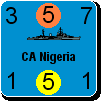composer99
Posts: 2923
Joined: 6/6/2005
From: Ottawa, Canada
Status: offline

|
quote:
ORIGINAL: delatbabel
quote:
ORIGINAL: composer99
I must also agree with Steve who has pointed out it is simply much too simplistic to boil WiF down to being decided exclusively by the German-Soviet war, even granting that it is the most important front (as is proper).
We'll have to agree to disagree then.
I just cannot see how it's possible, given the victory conditions, how it's possible for Germany to beat Russia and for then the allies to win the game. Similarly I cannot see how it's possible for Russia to defeat Germany and for the axis to win the game. If you could walk me through how you think the game might progress in either of those two scenarios, I might be convinced but I'm just not getting it.
There are, I think, two points to be made against the exclusivity of Germany vs. USSR conflict as a deciding factor of victory/defeat in (M)WiF.
The TL;DR version:
(1) Objectives: The Axis needs 16+ objectives to win the game assuming everyone has 0 bid, and <14 to lose. Between Berlin & Moscow inclusive (also including Stockholm & Helsinki but excluding Athens) there are but 12 objective hexes. Germany could control those 12 - and even Sverdlosk and Vladivostok, to completely conquer the USSR, and still lose. On the other side of the coin, Japan can very nearly conquer and hold onto enough objectives to win the game single-handedly, if it conquers China and maintains a strong position in the Pacific, even if Germany is out of the game or on its last legs. Other bid circumstances give a corresponding advantage to the side with the lower bid.
(2) Focus: The action limit/impulse system and the constant shortage of time and units that both sides face gives each side an incentive to "focus fire" on a single enemy major power, which must inevitably crumble under such an onslaught. But the same constraints also punish such focus by affording the rest of the opposing side a free hand.
To expand a bit on these:
Objectives:
- Barring extremely early US entry or extraordinarily bad luck fighting the USSR, it follows that if Germany is ploughed under (even to the point of being completely conquered), it will be at the expense of Allied resources and effort dedicated against Japan (and perhaps even Italy). They should have a correspondingly easier time taking and holding on to their objectives in order to meet the magic number for victory.
- The ability of the Allies to win despite a weak USSR will depend on the degree to which the USSR has been beaten (conquest? almost-conquest? limited comeback ability?) and the degree to which the German victory has come at the expense of dedicating resoures & effort vs. the Commonwealth or to defending Italy.
Second, the matter of focus:
- With the exception of Japan fighting China in 1939-1940, as far as I can see, the more focused each side gets fighting one power, the more opportunities it allows the other side, thus negating the advantages gained by focusing on one opponent.
For example, if Germany & Italy elect to perform a "kitchen sink" Barbarossa, which is the surest path to victory against the USSR, this can leave the Commonwealth more or less unmolested after the fall of France. This leaves open the possibility of a Commonwealth strategic invasion of Italy & Albania in 1941 (and possibly even complete conquest of Italy if the CW has already dealt with East Africa and Libya). Bolstering the defence of Italy beforehand either diverts resources from the "kitchen sink" attack or leaves Germany dangerously short units elsewhere (primarily France). Bolstering it after the fact has the same effect, with the added penalty that German plans are being disrupted to boot.
Likewise, if the Allies focus very strongly on Germany, leaving Japan almost unmolested (save to put up a stiff passive defence of objective hexes), they will likely find that the Japanese are much too strong to be beaten down in time to win the game. As an example, consider this game report of a table-top WiF game. The Axis did poorly, for a WiF game, but were helped by misplaced Allied focus: the US attacked several South American minor countries (presumably to secure their production) and was largely timid against Japan. As such, even though Germany was completely conquered, Japan held on to (individually?) win the game, boosted by the victory point penalty the Allies suffer for aggression in the Americas. [I should note that the players are using the historical totals as their benchmark for victory - without the penalties the Allies took the Axis side would technically have lost.]
This issue is exacerbated by the vagaries of chance. Steve mentions the possibility of a poor Japanese showing in China, which opens up two lines of opportunity for the other Allies:
(1) They can weaken their resource allocation vs. Japan and still get acceptable outcomes in theatre, allowing more resource allocation vs. Germany/Italy.
(2) They can maintain a "normal" resource allocation vs. Japan, smack it down more easily, thereby getting to focus in detail on Germany earlier in the game.
Either way, Germany's ability to earn a decisive victory by "beating" the USSR is weakened - especially if Germany & Italy went for a "kitchen sink" campaign and have left Italy vulnerable.
_____________________________
~ Composer99
|
 Printable Version
Printable Version







 . Needless to say the game did not last too long
. Needless to say the game did not last too long 




 New Messages
New Messages No New Messages
No New Messages Hot Topic w/ New Messages
Hot Topic w/ New Messages Hot Topic w/o New Messages
Hot Topic w/o New Messages Locked w/ New Messages
Locked w/ New Messages Locked w/o New Messages
Locked w/o New Messages Post New Thread
Post New Thread